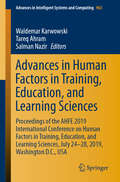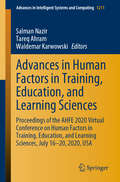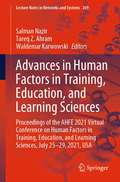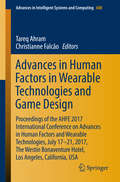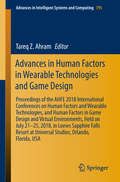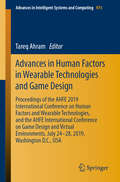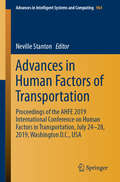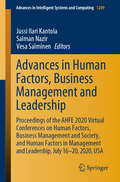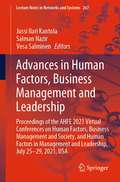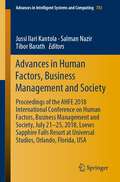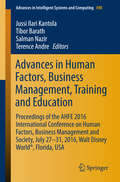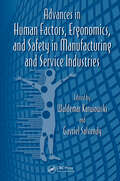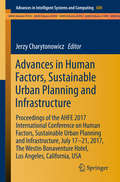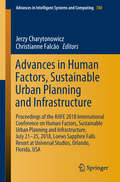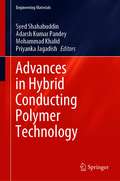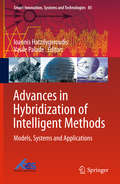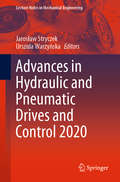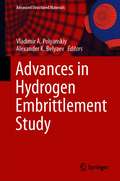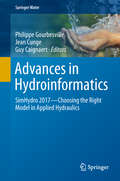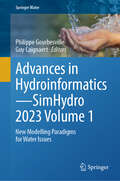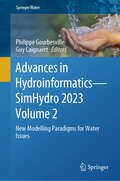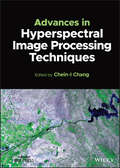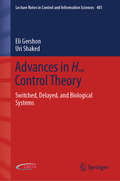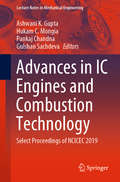- Table View
- List View
Advances in Human Factors in Training, Education, and Learning Sciences: Proceedings of the AHFE 2019 International Conference on Human Factors in Training, Education, and Learning Sciences, July 24-28, 2019, Washington D.C., USA (Advances in Intelligent Systems and Computing #963)
by Salman Nazir Waldemar Karwowski Tareq AhramThis book focuses on the importance of human factors in optimizing the learning and training process. It reports on the latest research and best practices and discusses key principles of behavioral and cognitive science, which are extremely relevant to the design of instructional content and new technologies to support mobile and multimedia learning, virtual training and web-based learning, among others, as well as performance measurements, social and adaptive learning and many other types of educational technologies, with a special emphasis on those important in the corporate, higher education, and military training contexts. Based on the AHFE 2019 Conference on Human Factors in Training, Education, and Learning Sciences, held on July 24-28, 2019, in Washington D.C., USA, the book offers a timely perspective on the role of human factors in education. It highlights important new ideas and will fosters new discussions on how to optimally design learning experiences.
Advances in Human Factors in Training, Education, and Learning Sciences: Proceedings of the AHFE 2020 Virtual Conference on Human Factors in Training, Education, and Learning Sciences, July 16-20, 2020, USA (Advances in Intelligent Systems and Computing #1211)
by Salman Nazir Waldemar Karwowski Tareq AhramThis book addresses the importance of human factors in optimizing the learning and training process. It reports on the latest research and best practices, and discusses key principles of behavioral and cognitive science, which are extremely relevant to the design of instructional content and new technologies to support mobile and multimedia learning, virtual training and web-based learning, among others, as well as performance measurements, social and adaptive learning and many other types of educational technology, with a special emphasis on those important in the corporate, higher education, healthcare and military training contexts. Gathering contributions to the AHFE 2020 Virtual Conference on Human Factors in Training, Education, and Learning Sciences, held on July 16–20, 2020, the book offers a timely perspective on the role of human factors in education. It highlights important new approaches and ideas, and fosters new discussions on how to optimally design learning experiences.
Advances in Human Factors in Training, Education, and Learning Sciences: Proceedings of the AHFE 2021 Virtual Conference on Human Factors in Training, Education, and Learning Sciences, July 25-29, 2021, USA (Lecture Notes in Networks and Systems #269)
by Salman Nazir Waldemar Karwowski Tareq Z. AhramThis book addresses the importance of human factors in optimizing the learning and training process. It reports on the latest research and best practices relating to the application of behavioral and cognitive science, and new technologies in the design of instructional and training content. It proposes innovative strategies for improving the learning and training experience and outcomes in different contexts, including lower and higher education, and different industry sectors. A special emphasis is given to digital and distance learning, gamification, and virtual training. Gathering contributions to the AHFE 2021 Conference on Human Factors in Training, Education, and Learning Sciences, held virtually on July 25-29, 2021, from USA, this book offers extensive information and a thought-provoking guide for both researchers and practitioners in the field of education and training.
Advances in Human Factors in Wearable Technologies and Game Design: Proceedings of the AHFE 2017 International Conference on Advances in Human Factors and Wearable Technologies, July 17-21, 2017, The Westin Bonaventure Hotel, Los Angeles, California, USA (Advances in Intelligent Systems and Computing #608)
by Tareq Ahram Christianne FalcãoThis book focuses on the human aspects of wearable technologies and game design, which are often neglected. It shows how user centered practices can optimize wearable experience, thus improving user acceptance, satisfaction and engagement towards novel wearable gadgets. It describes both research and best practices in the applications of human factors and ergonomics to sensors, wearable technologies and game design innovations, as well as results obtained upon integration of the wearability principles identified by various researchers for aesthetics, affordance, comfort, contextual-awareness, customization, ease of use, ergonomy, intuitiveness, obtrusiveness, information overload, privacy, reliability, responsiveness, satisfaction, subtlety, user friendliness and wearability. The book is based on the AHFE 2017 Conferences on Human Factors and Wearable Technologies and AHFE 2017 Conferences on Human Factors and Game Design, held on July 17-21, 2017, in Los Angeles, California, USA, and addresses professionals, researchers, and students dealing with the human aspects of wearable, smart and/or interactive technologies and game design research.
Advances in Human Factors in Wearable Technologies and Game Design: Proceedings of the AHFE 2018 International Conferences on Human Factors and Wearable Technologies, and Human Factors in Game Design and Virtual Environments, Held on July 21–25, 2018, in Loews Sapphire Falls Resort at Universal Studios, Orlando, Florida, USA (Advances in Intelligent Systems and Computing #795)
by Tareq Z. AhramThis book focuses on the human aspects of wearable technologies and game design, which are often neglected. It shows how user centered practices can optimize wearable experience, thus improving user acceptance, satisfaction and engagement towards novel wearable gadgets. It describes both research and best practices in the applications of human factors and ergonomics to sensors, wearable technologies and game design innovations, as well as results obtained upon integration of the wearability principles identified by various researchers for aesthetics, affordance, comfort, contextual-awareness, customization, ease of use, ergonomy, intuitiveness, obtrusiveness, information overload, privacy, reliability, responsiveness, satisfaction, subtlety, user friendliness and wearability. The book is based on the AHFE 2018 Conference on Human Factors and Wearable Technologies and the AHFE 2018 Conference on Human Factors in Game Design and Virtual Environments , held on July 21–25, 2018 in Orlando, Florida, and addresses professionals, researchers, and students dealing with the human aspects of wearable, smart and/or interactive technologies and game design research.
Advances in Human Factors in Wearable Technologies and Game Design: Proceedings of the AHFE 2019 International Conference on Human Factors and Wearable Technologies, and the AHFE International Conference on Game Design and Virtual Environments, July 24-28, 2019, Washington D.C., USA (Advances in Intelligent Systems and Computing #973)
by Tareq AhramThis book focuses on the human aspects of wearable technologies and game design, which are often neglected. It shows how user-centered practices can optimize the wearable experience, thus improving user acceptance, satisfaction and engagement with novel wearable gadgets. It addresses both research and best practices in the applications of human factors and ergonomics to sensors, wearable technologies and game design innovations, as well as new findings on the integration of wearability principles with regard to: aesthetics, affordance, comfort, contextual awareness, customization, ease of use, ergonomics, information overload, intuitiveness, obtrusiveness, privacy, reliability, responsiveness, satisfaction, subtlety, user-friendliness and wearability. Gathering the outcomes of both the AHFE 2019 Conference on Human Factors and Wearable Technologies and the AHFE 2019 Conference on Human Factors in Game Design and Virtual Environments, held on July 24–28, 2019 in Washington, DC, USA, the book addresses the needs of professionals, researchers, and students whose work involves the human aspects of wearable, smart and/or interactive technologies and game design research.
Advances in Human Factors of Transportation: Proceedings of the AHFE 2019 International Conference on Human Factors in Transportation, July 24-28, 2019, Washington D.C., USA (Advances in Intelligent Systems and Computing #964)
by Neville StantonThis book discusses the latest advances in research and development, design, operation and analysis of transportation systems and their complementary infrastructures. It reports on both theories and case studies on road and rail, aviation and maritime transportation. Further, it covers a wealth of topics, from accident analysis, vehicle intelligent control, and human-error and safety issues to next-generation transportation systems, model-based design methods, simulation and training techniques, and many more. A special emphasis is placed on smart technologies and automation in transport, and on the user-centered, ergonomic and sustainable design of transport systems. The book, which is based on the AHFE 2019 International Conference on Human Factors in Transportation, held on July 24-28, 2019, in Washington D.C., USA, mainly addresses the needs of transportation system designers, industrial designers, human–computer interaction researchers, civil and control engineers, as well as vehicle system engineers. Moreover, it represents a timely source of information for transportation policy-makers and social scientists whose work involves traffic safety, management, and sustainability issues in transport.
Advances in Human Factors, Business Management and Leadership: Proceedings of the AHFE 2020 Virtual Conferences on Human Factors, Business Management and Society, and Human Factors in Management and Leadership, July 16-20, 2020, USA (Advances in Intelligent Systems and Computing #1209)
by Jussi Ilari Kantola Salman Nazir Vesa SalminenThis book analyzes new theories and practical approaches for promoting excellence in human resource management and leadership. It shows how the principles of creating shared value can be applied to ensure faster learning, training, business development and social renewal. In particular, it presents novel methods and tools for tackling the complexity of management and learning in both business organizations and society. Discussing ontologies, intelligent management systems, and methods for creating knowledge and value added, it offers novel insights into time management and operations optimization, as well as advanced methods for evaluating customers’ satisfaction and conscious experience. Based on three AHFE 2020 Virtual Conferences: the AHFE 2020 Conference on Human Factors, Business Management and Society, the AHFE 2020 Conference on Human Factors in Management and Leadership, held on July 16–20, 2020, the book provides researchers and professionals with extensive information, practical tools and inspiring ideas for achieving excellence in a broad spectrum of business and societal activities.
Advances in Human Factors, Business Management and Leadership: Proceedings of the AHFE 2021 Virtual Conferences on Human Factors, Business Management and Society, and Human Factors in Management and Leadership, July 25-29, 2021, USA (Lecture Notes in Networks and Systems #267)
by Jussi Ilari Kantola Salman Nazir Vesa SalminenThis book analyzes new theories and practical approaches for promoting excellence in human resource management and leadership. It shows how the principles of creating shared value can be applied to ensure faster learning, training, business development and social renewal. In particular, it presents novel methods and tools for tackling the complexity of management and learning in both business organizations and society. Gathering the proceedings of the AHFE 2021 Conferences on Human Factors, Business Management and Society, and Human Factors in Management and Leadership, held virtually on July 25–29, 2021, from USA, this book provides researchers and professionals with extensive information, practical tools and inspiring ideas for achieving excellence in a broad spectrum of business and societal activities.
Advances in Human Factors, Business Management and Society: Proceedings of the AHFE 2018 International Conference on Human Factors, Business Management and Society, July 21-25, 2018, Loews Sapphire Falls Resort at Universal Studios, Orlando, Florida, USA (Advances in Intelligent Systems and Computing #783)
by Jussi Ilari Kantola Tibor Barath Salman NazirThis book presents practical approaches for facilitating the achievement of excellence in the management and leadership of organizational resources. It shows how the principles of creating shared value can be applied to ensure faster learning, training, business development, and social renewal. In particular, it presents novel methods and tools for tackling the complexity of management and learning in both business organizations and society. Discussing ontologies, intelligent management systems, methods for creating knowledge and value added, it offers novel insights into time management and operations optimization, as well as advanced methods for evaluating customers’ satisfaction and conscious experience. Based on two conferences, the AHFE 2018 International Conference on Human Factors, Business Management and Society, and the AHFE 2018 International Conference on Human Factors in Management and Leadership, held on July 21–25, 2018, in Orlando, Florida, USA, the book provides both researchers and professionals with new tools and inspiring ideas for achieving excellence in various business activities.
Advances in Human Factors, Business Management, Training and Education: Proceedings of the AHFE 2016 International Conference on Human Factors, Business Management and Society, July 27-31, 2016, Walt Disney World®, Florida, USA (Advances in Intelligent Systems and Computing #498)
by Jussi Ilari Kantola Tibor Barath Salman Nazir Terence AndreThis book reports on practical approaches for facilitating the process of achieving excellence in the management and leadership of organizational resources. It shows how the principles of creating shared value can be applied to ensure faster learning, training, business development, and social renewal. In particular, the book presents novel methods and tools for tackling the complexity of management and learning in both business organizations and society. It covers ontologies, intelligent management systems, methods for creating knowledge and value added. It gives novel insights into time management and operations optimization, as well as advanced methods for evaluating customers' satisfaction and conscious experience. Based on the AHFE 2016 International Conference on Human Factors, Business Management and Society, held on July 27-31, 2016, Walt Disney World®, Florida, USA, the book provides both researchers and professionals with new tools and inspiring ideas for achieving excellence in various business activities.
Advances in Human Factors, Ergonomics, and Safety in Manufacturing and Service Industries
by Gavriel Salvendy Waldemar KarwowskiThis volume is concerned with the human factors, ergonomics, and safety issues related to the design of products, processes, and systems, as well as operation and management of business enterprises in both manufacturing and service sectors of contemporary industry. The book is organized into ten sections that focus on the following subject matters:
Advances in Human Factors, Sustainable Urban Planning and Infrastructure: Proceedings of the AHFE 2017 International Conference on Human Factors, Sustainable Urban Planning and Infrastructure, July 17−21, 2017, The Westin Bonaventure Hotel, Los Angeles, California, USA (Advances in Intelligent Systems and Computing #600)
by Jerzy CharytonowiczThis book deals with human factors research directed towards realizing and assessing sustainability in the built environment. It reports on advanced engineering methods for sustainable infrastructure design, as well as on assessments of the efficient methods and the social, environmental, and economic impact of various designs and projects. The book covers a range of topics, including the use of recycled materials in architecture, ergonomics in buildings and public design, sustainable design for smart cities, design for the aging population, industrial design, human scale in architecture, and many more. Based on the AHFE 2017 International Conference on Human Factors, Sustainable Urban Planning and Infrastructure, held on July 17-21, 2017, in Los Angeles, California, USA, this book, by showing different perspectives on sustainability and ergonomics, represents a useful source of information for designers in general, urban engineers, architects, infrastructure professionals, practitioners, public infrastructure owners, policy makers, government engineers and planners, as well as operations managers, and academics active in applied research.
Advances in Human Factors, Sustainable Urban Planning and Infrastructure: Proceedings of the AHFE 2018 International Conference on Human Factors, Sustainable Urban Planning and Infrastructure, July 21-25, 2018, Loews Sapphire Falls Resort at Universal Studios, Orlando, Florida, USA (Advances in Intelligent Systems and Computing #788)
by Jerzy Charytonowicz Christianne FalcãoThis book discusses human factors research directed towards realizing and assessing sustainability in the built environment. It reports on advanced engineering methods for sustainable infrastructure design, as well as on assessments of the efficient methods and the social, environmental, and economic impact of various designs and projects. The book covers a range of topics, including the use of recycled materials in architecture, ergonomics in buildings and public design, sustainable design for smart cities, design for the aging population, industrial design, human scale in architecture, and many more. Based on the AHFE 2018 International Conference on Human Factors, Sustainable Urban Planning and Infrastructure, held on July 21–25, 2018, in Orlando, Florida, USA, it offers various perspectives on sustainability and ergonomics. As such, it is a valuable reference resource for designers, urban engineers, architects, infrastructure professionals, public infrastructure owners, policy makers, government engineers and planners, as well as operations managers and academics active in urban and infrastructure research.
Advances in Hybrid Conducting Polymer Technology (Engineering Materials)
by Mohammad Khalid Syed Shahabuddin Adarsh Kumar Pandey Priyanka JagadishThis book presents synthesis methods, characterization techniques, properties and applications of hybrid conducting polymers. Special emphasis is given to the applications of hybrid conductive polymers, with chapters ranging from electronic devices, environmental remediation, and sensors, to medical applications.
Advances in Hybridization of Intelligent Methods: Models, Systems and Applications (Smart Innovation, Systems and Technologies #85)
by Vasile Palade Ioannis HatzilygeroudisThis book presents recent research on the hybridization of intelligent methods, which refers to combining methods to solve complex problems. It discusses hybrid approaches covering different areas of intelligent methods and technologies, such as neural networks, swarm intelligence, machine learning, reinforcement learning, deep learning, agent-based approaches, knowledge-based system and image processing. The book includes extended and revised versions of invited papers presented at the 6th International Workshop on Combinations of Intelligent Methods and Applications (CIMA 2016), held in The Hague, Holland, in August 2016. The book is intended for researchers and practitioners from academia and industry interested in using hybrid methods for solving complex problems.
Advances in Hydraulic and Pneumatic Drives and Control 2020 (Lecture Notes in Mechanical Engineering)
by Jarosław Stryczek Urszula WarzyńskaThis book reports on cutting-edge research and technical achievements in the field of hydraulic drives. The chapters, selected from contributions presented at the International Scientific-Technical Conference on Hydraulic and Pneumatic Drives and Controls, NSHP 2020, held on October 21-23, 2020, in Trzebieszowice, Poland, cover a wide range of topics such as theoretical advances in fluid technology, work machines in mining, construction, marine and manufacturing industry, and practical issues relating to the application and operation of hydraulic drives. Further topics include: safety and environmental issues associated with the use of machines with hydraulic drive, and new materials in design of hydraulic components. A special emphasis is given to new solutions for hydraulic components and systems as well as to the identification of phenomena and processes occurring during the operation of hydraulic and pneumatic systems.
Advances in Hydraulic and Pneumatic Drives and Control 2023 (Lecture Notes in Mechanical Engineering)
by Jarosław Stryczek Urszula WarzyńskaThis book reports on cutting-edge research and technical achievements in the field of hydraulic drives. The chapters, selected from contributions presented at the International Scientific-Technical Conference on Hydraulic and Pneumatic Drives and Controls, NSHP 2023, held on October 11-13, 2023, in Piechowice, Poland, cover a wide range of topics such as theoretical advances in fluid technology, work machines in mining, construction, marine and manufacturing industry, and practical issues relating to the application and operation of hydraulic drives. Further topics include: safety and environmental issues associated with the use of machines with hydraulic drive, designing test stands with hydraulic and pneumatic components, advancing control of hydraulic systems, analyzing vibration issues, application of renewable energy sources, and new materials in the design of hydraulic components. Special emphasis is given to new solutions for hydraulic components and systems as well as to the identification of phenomena and processes occurring during the operation of hydraulic and pneumatic systems.
Advances in Hydrogen Embrittlement Study (Advanced Structured Materials #143)
by Alexander K. Belyaev Vladimir A. PolyanskiyThe book presents a collection of chapters on the current problems associated with hydrogen damage. It discusses the effect of hydrogen on material properties and its interaction with the material microstructure, physical features of hydrogen transport in metals and alloys, as well as applicable methods of measuring concentration of hydrogen in solid media.
Advances in Hydroinformatics: Simhydro 2014 - Modeling And Simulation Of Fast Hydraulic Transients (Springer Water)
by Philippe Gourbesville Jean Cunge Guy CaignaertThis book gathers a collection of extended papers based on presentations given during the SimHydro 2017 conference, held in Sophia Antipolis, Nice, France on June 14–16, 2017. It focuses on how to choose the right model in applied hydraulics and considers various aspects, including the modeling and simulation of fast hydraulic transients, 3D modeling, uncertainties and multiphase flows. The book explores both limitations and performance of current models and presents the latest developments in new numerical schemes, high-performance computing, multiphysics and multiscale methods, and better interaction with field or scale model data. It gathers the lastest theoretical and innovative developments in the modeling field and presents some of the most advance applications on various water related topics like uncertainties, flood simulation and complex hydraulic applications. Given its breadth of coverage, it addresses the needs and interests of practitioners, stakeholders, researchers and engineers alike.
Advances in Hydroinformatics—SimHydro 2023 Volume 1: New Modelling Paradigms for Water Issues (Springer Water)
by Philippe Gourbesville Guy CaignaertThis book includes a collection of extended papers based on presentations given during the SimHydro 2023 conference, held in EDF Lab Chatou, France, with the support of Société Hydrotechnique de France (SHF), the Association Française de Mécanique (AFM), the Environmental and Water Resources Institute (EWRI), and the International Association for Hydro-Environment Engineering and Research (IAHR). SimHydro conferences, since 2010, have created a regular forum where major actors of the hydroinformatics domain and stakeholders meet, share, and debate about needs, innovations, and implementations of models and their inputs for decision making. For this new edition, the general theme of the conference is focused on “New modelling paradigms for water issues”. The papers address some of the key challenges faced by the water modelling community regarding processes to simulate such as water services, extreme events (floods, droughts, etc.), and hydrological cycle at catchment scale and to assess the added value of emerging concepts and methods such as Artificial Intelligence (AI) and Digital Twins that are gaining interests. It addresses the interests of practitioners, stakeholders, researchers, and engineers active in this field. This book represents Volume 1 of a two-volume book series.
Advances in Hydroinformatics—SimHydro 2023 Volume 2: New Modelling Paradigms for Water Issues (Springer Water)
by Philippe Gourbesville Guy CaignaertThis book includes a collection of extended papers based on presentations given during the SimHydro 2023 conference, held in EDF Lab Chatou, France, with the support of Société Hydrotechnique de France (SHF), the Association Française de Mécanique (AFM), the Environmental and Water Resources Institute (EWRI), and the International Association for Hydro-Environment Engineering and Research (IAHR). SimHydro conferences, since 2010, have created a regular forum where major actors of the hydroinformatics domain and stakeholders meet, share, and debate about needs, innovations, and implementations of models and their inputs for decision making. For this new edition, the general theme of the conference is focused on “New modelling paradigms for water issues”. The papers address some of the key challenges faced by the water modelling community regarding processes to simulate such as water services, extreme events (floods, droughts, etc.), and hydrological cycle at catchment scale and to assess the added value of emerging concepts and methods such as Artificial Intelligence (AI) and Digital Twins that are gaining interests. It addresses the interests of practitioners, stakeholders, researchers, and engineers active in this field. This book represents Volume 2 of a two-volume book series.
Advances in Hyperspectral Image Processing Techniques (IEEE Press)
by Chein‐I ChangAdvances in Hyperspectral Image Processing Techniques Authoritative and comprehensive resource covering recent hyperspectral imaging techniques from theory to applications Advances in Hyperspectral Image Processing Techniques is derived from recent developments of hyperspectral imaging (HSI) techniques along with new applications in the field, covering many new ideas that have been explored and have led to various new directions in the past few years. The work gathers an array of disparate research into one resource and explores its numerous applications across a wide variety of disciplinary areas. In particular, it includes an introductory chapter on fundamentals of HSI and a chapter on extensive use of HSI techniques in satellite on-orbit and on-board processing to aid readers involved in these specific fields. The book’s content is based on the expertise of invited scholars and is categorized into six parts. Part I provides general theory. Part II presents various Band Selection techniques for Hyperspectral Images. Part III reviews recent developments on Compressive Sensing for Hyperspectral Imaging. Part IV includes Fusion of Hyperspectral Images. Part V covers Hyperspectral Data Unmixing. Part VI offers different views on Hyperspectral Image Classification. Specific sample topics covered in Advances in Hyperspectral Image Processing Techniques include: Two fundamental principles of hyperspectral imaging Constrained band selection for hyperspectral imaging and class information-based band selection for hyperspectral image classification Restricted entropy and spectrum properties for hyperspectral imaging and endmember finding in compressively sensed band domain Hyperspectral and LIDAR data fusion, fusion of band selection methods for hyperspectral imaging, and fusion using multi-dimensional information Advances in spectral unmixing of hyperspectral data and fully constrained least squares linear spectral mixture analysis Sparse representation-based hyperspectral image classification; collaborative hyperspectral image classification; class-feature weighted hyperspectral image classification; target detection approach to hyperspectral image classification With many applications beyond traditional remote sensing, ranging from defense and intelligence, to agriculture, to forestry, to environmental monitoring, to food safety and inspection, to medical imaging, Advances in Hyperspectral Image Processing Techniques is an essential resource on the topic for industry professionals, researchers, academics, and graduate students working in the field.
Advances in H∞ Control Theory: Switched, Delayed, and Biological Systems (Lecture Notes in Control and Information Sciences #481)
by Eli Gershon Uri ShakedAdvances in H∞ Control Theory is concerned with state-of-the-art developments in three areas:the extended treatment of mostly deterministic switched systems with dwell-time;the control of retarded stochastic state-multiplicative noisy systems; anda new approach to the control of biochemical systems, exemplified by the threonine synthesis and glycolytic pathways.Following an introduction and extensive literature survey, each of these major topics is the subject of an individual part of the book.The first two parts of the book contain several practical examples taken from various fields of control engineering including aircraft control, robot manipulation and process control. These examples are taken from the fields of deterministic switched systems and state-multiplicative noisy systems.The text is rounded out with short appendices covering mathematical fundamentals: σ-algebra and the input-output method for retarded systems.Advances in H∞ Control Theory is written for engineers engaged in control systems research and development, for applied mathematicians interested in systems and control and for graduate students specializing in stochastic control.
Advances in IC Engines and Combustion Technology: Select Proceedings of NCICEC 2019 (Lecture Notes in Mechanical Engineering)
by Ashwani K. Gupta Gulshan Sachdeva Hukam C. Mongia Pankaj ChandnaThis book comprises select peer-reviewed proceedings of the 26th National Conference on IC Engines and Combustion (NCICEC) 2019 which was organised by the Department of Mechanical Engineering, National Institute of Technology Kurukshetra under the aegis of The Combustion Institute-Indian Section (CIIS). The book covers latest research and developments in the areas of combustion and propulsion, exhaust emissions, gas turbines, hybrid vehicles, IC engines, and alternative fuels. The contents include theoretical and numerical tools applied to a wide range of combustion problems, and also discusses their applications. This book can be a good reference for engineers, educators and researchers working in the area of IC engines and combustion.
